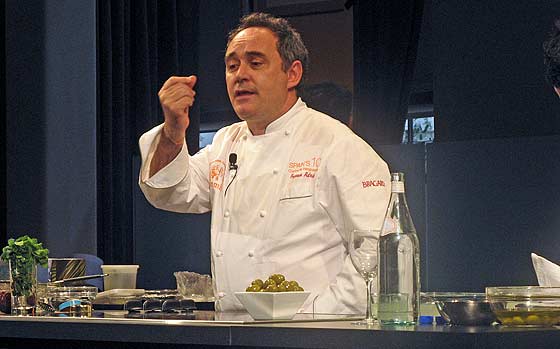
Most people know Ferran Adrià as food’s preeminent futurist, the godfather of foam and other gastronomic advances, a mad Catalonian scientist who spends half the year cloistered away in his culinary lab and the other half making culinary history at El Bulli. But when he and nine like-minded compatriots came to town this month to promote Spain and lend some flash and dazzle to the French Culinary Institute’s subsumption into the new International Culinary Center, we found the world’s top chef to have more in common with us mere mortals than his lofty reputation (and, he believes, misunderstood culinary intentions) might suggest. Adrià, it turns out, doesn’t like to eat (some of) his vegetables, has some issues with business (and business-class) meals, and likes his mother’s tortilla best.
What’s your favorite New York restaurant?
Do you really want me not to be allowed into any restaurants here from now on?
Well, where have you been lately?
I do a lot of hopping. I might go to five or six places in a day. On this particular trip, I’ve been to Masa and Morimoto. The other day, I went to DB with Daniel Boulud. Normally, I don’t really like to call ahead and say, “Hi, this is Ferran Adrià, you need to find me a table.”
People have described your style as molecular gastronomy. Why does that phrase bother you?
Well, for starters, it doesn’t exist. That’s the biggest lie out there in terms of cooking. What is molecular cooking?
Well, you’re definitely known for unexpected flavor combinations. What two ingredients would you never think of combining?
Why not mix this and that? If soy goes well with fish, how come no one does beef carpaccio with soy? Why do we have such a taste and not another? It’s all about culture. There is something, however, that I really don’t like: bell peppers.
Then you’re open to anything except bell peppers? Why don’t you like them?
With the pepper, it doesn’t have to do with the cultural. It has to do with personal preference. You cannot apply reason to this. I just don’t happen to like them.
Has anyone ever sent anything back at El Bulli?
Yeah, it happens. There are people who may like one dish more than another. If I were a customer, and I was given a dish with peppers, I would hate it. I also don’t like blood sausage.
Would you send it back?
Depends on where I am. If I was in a high-cuisine restaurant, I’d probably go for it and eat it. I’d want to see the concept.
What’s always in your home refrigerator?
I hardly ever eat at home. It’s been like that for the past five years.
Well, if you did, and if you could invite anyone, living or dead, to dinner, who would it be?
Picasso.
What food most reminds you of your childhood?
My mom’s potato omelette. If we were really to judge it in terms of classic cooking, to what extent it would be the perfect potato omelette, I don’t know. But I have that romantic idea of it.
Do you have any guilty pleasures?
Yes, Bollycao. Something you grow up with as a kid in Spain: a kind of bread, sweet and eggy, with chocolate in the middle.
As a master of contrasting textures, do you have a favorite one?
That’s very, very hard to pick just one, but if I had to—the melting fat of Ibérico ham.
Could El Bulli exist outside its particular remote location in Spain?
In a city, it’s very hard to do a restaurant, an avant-garde-cuisine restaurant, where each year you need to change the whole menu. For six months, all we do is think and think. We think and explore and reflect. We never have business meals at El Bulli. If it’s about business, you’re probably not paying much attention to the food.
How was the food on your flight?
It’s hard to explain how it can be that bad, particularly when you’re flying business.
Have you ever considered changing that?
I might have thought about it, but I’ve thought about so many things. One can try to help from day to day, but to fight against the whole system is very tiring.